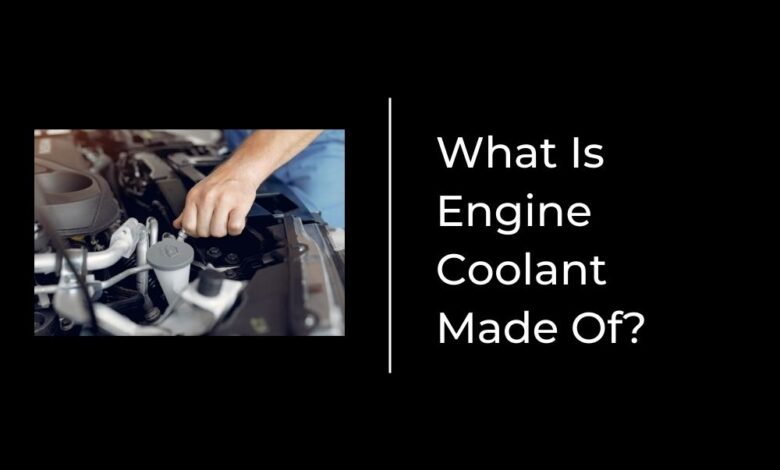What Is Engine Coolant Made Of?

Engine coolant is a crucial fluid that helps maintain your vehicle’s engine at an optimal temperature. Without it, engines can overheat or freeze, leading to serious damage. But what exactly is engine coolant made of? Understanding its components can help you appreciate its role and the importance of regular maintenance. In this article, we will break down what engine coolant is, its ingredients, and why it’s vital for your car’s performance.
Understanding Engine Coolant
What Is Engine Coolant?
- Definition and Function: Engine coolant, also known as antifreeze, is a liquid mixture that absorbs heat from the engine and dissipates it through the radiator. It prevents the engine from overheating in hot weather and from freezing in cold weather.
Note:- For reliable Engine Coolant Manufacturer and Supplier in Dubai, look no further than Blue Middle East. With a reputation for quality and reliability, Blue Middle East is a trusted provider of engine coolant solutions for various industries and applications.
Why Is Engine Coolant Important?
- Temperature Regulation: Coolant ensures that the engine operates within a safe temperature range. This prevents overheating and freezing, which can cause engine parts to crack or seize.
- Corrosion Prevention: Coolant contains additives that prevent corrosion and rust in the engine and cooling system components, extending their lifespan.
The Main Components of Engine Coolant
Water
- Base Fluid: Water is a primary component of engine coolant because of its excellent heat transfer properties. However, water alone is not sufficient because it can freeze at low temperatures and boil at high temperatures.
Ethylene Glycol or Propylene Glycol
- Antifreeze Agents: These chemicals lower the freezing point and raise the boiling point of the coolant, making it effective in a wide range of temperatures.
- Ethylene Glycol: The most common antifreeze agent, known for its high-performance properties but toxic if ingested.
- Propylene Glycol: Less toxic than ethylene glycol, making it a safer alternative, especially in environments where accidental ingestion might occur.
Additives in Engine Coolant
Corrosion Inhibitors
- Protecting the Engine: These additives prevent corrosion and rust from forming in the engine and cooling system. They protect metal parts such as the radiator, water pump, and engine block from degradation.
Anti-Foaming Agents
- Maintaining Fluid Integrity: These agents reduce the formation of foam, which can impair the coolant’s ability to transfer heat effectively. Foaming can lead to air pockets that reduce cooling efficiency.
Dyes
- Identification and Leak Detection: Coolant is often colored (typically green, red, or blue) to help identify the type of coolant and make it easier to spot leaks.
Types of Engine Coolants
Inorganic Acid Technology (IAT)
- Traditional Coolants: Typically green in color, IAT coolants are made with ethylene glycol and contain silicate and phosphate corrosion inhibitors. They require more frequent replacement, usually every two years or 30,000 miles.
Organic Acid Technology (OAT)
- Modern Formulations: OAT coolants are usually orange, red, or dark green and are designed to last longer, typically five years or 150,000 miles. They do not contain silicates or phosphates, relying instead on organic acids to prevent corrosion.
Hybrid Organic Acid Technology (HOAT)
- Hybrid Approach: Combining features of both IAT and OAT, HOAT coolants often appear yellow or orange and provide long-lasting protection with the added benefit of silicate-based corrosion inhibitors. They also generally last around five years or 150,000 miles.
How to Choose the Right Coolant

Refer to Your Vehicle’s Manual
- Manufacturer Recommendations: Always consult your vehicle’s owner manual to determine the recommended type of coolant. Using the wrong type can lead to decreased performance and potential damage.
Consider Your Climate
- Temperature Extremes: If you live in an area with extreme temperatures, you may need a coolant with a higher concentration of antifreeze agents to ensure your engine is protected year-round.
How to Maintain Your Engine Coolant
Regular Checks
- Routine Maintenance: Check your coolant level regularly to ensure it’s within the proper range. Low coolant levels can lead to overheating and engine damage.
Coolant Replacement
- Flush and Fill: Over time, the additives in coolant break down, reducing its effectiveness. Regularly flushing and replacing the coolant according to your vehicle’s maintenance schedule helps maintain optimal performance.
Conclusion: The Science Behind Engine Coolant
Understanding what engine coolant is made of and its essential components can help you appreciate its role in keeping your engine running smoothly. By knowing the types of coolants and their specific benefits, you can make informed choices about maintaining your vehicle. Regular maintenance and using the right type of coolant ensure your engine stays cool, protected, and efficient, no matter the driving conditions.
Note:- For more articles visit on usafulnews.



